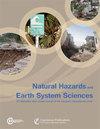Estimating the effects of meteorology and land cover on fire growth in Peru using a novel difference equation model
IF 4.7
2区 地球科学
Q1 GEOSCIENCES, MULTIDISCIPLINARY
引用次数: 0
Abstract
Abstract. Statistical analyses of wildfire growth are rarely undertaken, particularly in South America. In this study, we describe a simple and intuitive difference equation model of wildfire growth that uses a spread parameter to control the radial speed of the modeled fire and an extinguish parameter to control the rate at which the burning perimeter becomes inactive. Using data from the GlobFire project, we estimate these two parameters for 1003 large, multi-day fires in Peru between 2001 and 2020. For four fire-prone ecoregions within Peru, a set of 24 generalized linear models are fit for each parameter that use fire danger indexes and land cover covariates. Akaike weights are used to identify the best-approximating model and quantify model uncertainty. We find that, in most cases, increased spread rates and extinguish rates are positively associated with fire danger indexes. When fire danger indexes are included in the models, the spread component is usually the best choice, but we also find instances when the fire weather index and burning index are selected. We also find that grassland cover is positively associated with spread rates and extinguish rates in tropical forests, and that anthropogenic cover is negatively associated with spread rates in xeric ecoregions. We explore potential applications of this model to wildfire risk assessment and burned area forecasting.利用一种新的差分方程模型估计秘鲁气象和土地覆盖对火灾增长的影响
摘要很少对野火生长进行统计分析,特别是在南美洲。在这项研究中,我们描述了一个简单而直观的野火生长差分方程模型,该模型使用蔓延参数来控制模拟火灾的径向速度,并使用熄灭参数来控制燃烧周长变得不活跃的速度。利用GlobFire项目的数据,我们估算了2001年至2020年间秘鲁1003起持续多天的大型火灾的这两个参数。对于秘鲁境内的四个火灾易发生态区域,使用火灾危险指数和土地覆盖协变量对每个参数进行了一组24个广义线性模型的拟合。赤池权重用于识别最佳逼近模型和量化模型的不确定性。我们发现,在大多数情况下,蔓延率和灭火率的增加与火灾危险指数呈正相关。当模型中包含火灾危险指数时,通常选择蔓延分量,但我们也发现了选择火灾天气指数和燃烧指数的情况。我们还发现,在热带森林中,草地覆盖与蔓延率和扑灭率呈正相关,而在干旱生态区,人为覆盖与蔓延率呈负相关。我们探索了该模型在野火风险评估和烧毁面积预测中的潜在应用。
本文章由计算机程序翻译,如有差异,请以英文原文为准。
求助全文
约1分钟内获得全文
求助全文
来源期刊
CiteScore
7.60
自引率
6.50%
发文量
192
审稿时长
3.8 months
期刊介绍:
Natural Hazards and Earth System Sciences (NHESS) is an interdisciplinary and international journal dedicated to the public discussion and open-access publication of high-quality studies and original research on natural hazards and their consequences. Embracing a holistic Earth system science approach, NHESS serves a wide and diverse community of research scientists, practitioners, and decision makers concerned with detection of natural hazards, monitoring and modelling, vulnerability and risk assessment, and the design and implementation of mitigation and adaptation strategies, including economical, societal, and educational aspects.

 求助内容:
求助内容: 应助结果提醒方式:
应助结果提醒方式:


